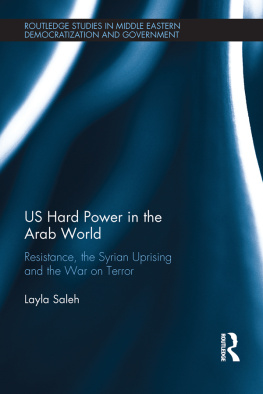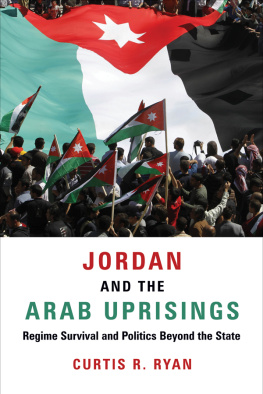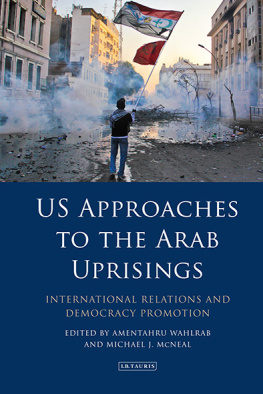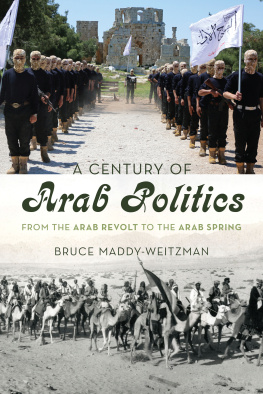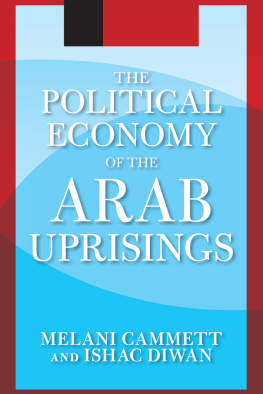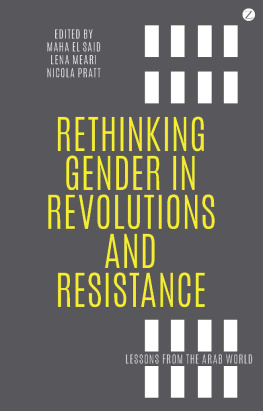US Hard Power in the Arab World
Neither stability nor change in the post-colonial Arab world can be fully understood without considering the international context, and American foreign policy in particular. However, the exact nature of Americas presence in the Arab world, and the scope and modes of its influence, all appear to have reached a crossroads since the Arab uprisings.
US Hard Power in the Arab World traces the USs power of persuasion in the Arab Middle East from the onset of the War on Terror in 2001 through to the Arab Spring. With a particular focus on Syria, the book explores the limits of an American smart power amid the emergence of a growing indigenous soft power whose ire is directed not only at Assads regime, but also at the violence perpetrated or enabled by the international community, headed by the US. It is argued that the blurring of the two forms of soft and hard American power has tarnished the credibility of US policies geared to win hearts and minds in the Arab world.
US Hard Power in the Arab World narrates the contests between attraction and intimidation, public diplomacy and military occupation, elites and publics, seduction and resistance. Drawing upon a multitude of primary sources, including personal interviews with Syrian activists and opposition figures, this book will be a valuable resource for students and scholars of Middle East politics, as well as those concerned with American foreign policy and the Arab Spring.
Layla Saleh is Assistant Professor of International Affairs at Qatar University. She holds a PhD in Political Science from the University of Wisconsin-Milwaukee, USA.
Routledge Studies in Middle Eastern Democratization and Government
Edited by Larbi Sadiki
Qatar University
This series examines new ways of understanding democratization and government in the Middle East. The varied and uneven processes of change, occurring in the Middle Eastern region, can no longer be read and interpreted solely through the prism of Euro-American transitology. Seeking to frame critical parameters in light of these new horizons, this series instigates reinterpretations of democracy and propagates formerly subaltern narratives of democratization. Reinvigorating discussion on how Arab and Middle Eastern peoples and societies seek good government, Routledge Studies in Middle Eastern Democratization and Government provides tests and contests of old and new assumptions.
Sufism and Politics in Morocco
Activism and Dissent
Abdelilah Bouasria
Political and Constitutional
Transitions in North Africa
Actors and Factors
Justin O. Frosini and
Francesco Biagi
Al Jazeera and Democratization
The Rise of the Arab Public Sphere
Ezzeddine Abdelmoula
Revolutionary Egypt
Connecting Domestic and
International Struggles
Edited by Reem Abou-El-Fadl
Oil States in the New Middle East
Uprisings and Stability
Edited by Kjetil Selvik and
Bjrn Olav Utvik
Politics of the Islamic Tradition
The Thought of Muhammad
Al-Ghazali
Mohammed Moussa
The Arab Lobby and the US
Factors for Success and Failure
Dania Koleilat Khatib
Hamas and the Media
Politics and Strategy
Wael Abdelal
Egyptians in Revolt
The Political Economy of Worker
and Student Mobilizations
19192011
Adel Abdel Ghafar
US Hard Power in the Arab
World
Resistance, the Syrian Uprising
and the War on Terror
Layla Saleh
First published 2017
by Routledge
2 Park Square, Milton Park, Abingdon, Oxon OX14 4RN
and by Routledge
711 Third Avenue, New York, NY 10017
Routledge is an imprint of the Taylor & Francis Group, an informa business
2017 Layla Saleh
The right of Layla Saleh to be identified as author of this work has been asserted by her in accordance with sections 77 and 78 of the Copyright, Designs and Patents Act 1988.
All rights reserved. No part of this book may be reprinted or reproduced or utilized in any form or by any electronic, mechanical, or other means, now known or hereafter invented, including photocopying and recording, or in any information storage or retrieval system, without permission in writing from the publishers.
Trademark notice: Product or corporate names may be trademarks or registered trademarks, and are used only for identification and explanation without intent to infringe.
British Library Cataloguing in Publication Data
A catalogue record for this book is available from the British Library
Library of Congress Cataloging in Publication Data
Names: Saleh, Layla, author
Title: US hard power in the Arab world: resistance, the Syrian uprising
and the war on terror / Layla Saleh.
Other titles: United States hard power in the Arab world
Description: Milton Park, Abingdon, Oxon; New York, NY: Routledge,
2017. |
Series: Routledge studies in Middle Eastern democratization and
government; v 15 | Includes bibliographical references and index.
Identifiers: LCCN 2016016770 | ISBN 9781138200838 (hardback) |
ISBN 9781315513010 (ebook)
Subjects: LCSH: United StatesForeign relationsMiddle
East. | Middle EastForeign relationsUnited States. | United StatesForeign relations
Arab countries. | Arab countriesForeign relationsUnited States. | Syria
Foreign relationsUnited States. | United StatesForeign relationsSyria. |
Arab Spring, 2010
Classification: LCC DS63.2.U5 S234 2017 | DDC 327.73017/4927dc23
LC record available at https://lccn.loc.gov/2016016770
ISBN: 978-1-138-20083-8 (hbk)
ISBN: 978-1-315-51301-0 (ebk)
Typeset in Times New Roman
by Wearset Ltd, Boldon, Tyne and Wear
It is no small feat to consider the ongoing Arab uprisings. Syrias poses heightened theoretical and normative challengesin its plunge from mass silmiyyah (peaceful) protests into grinding violence, in its ensemble cast of interveners, in its transformation into a barometer and battleground for regional ideological polarization, in its upending of rote narratives of Arabism and anti-imperialism, and in its defiance of reams of published knowledge on post-colonial Arab statehood itself. Above all, however, Syrias thawrah (revolution) confounds observers, analysts, and perhaps even participants in its persistenceacross modes of dissidence, lengthening odds, bloodier and bloodier stakes, and continual jousts between popular solidarity and its fragmentation.
Looming largest in Syrias roster of complications may be the international factor, at least partially embodied in US hegemony on the world stage. Neither stability nor change in the post-colonial Arab order since its contradiction-laden inception can be understood without attention to regional interactions as well as US investments and interventionism that outlasted the Soviet Uniononly to be newly challenged, perhaps, by Russian reemergence in the region. American regional endurance seems a dimension of stability un-budged by the cacophony of popular agency and the collective reclaiming of politics itself by the regions

